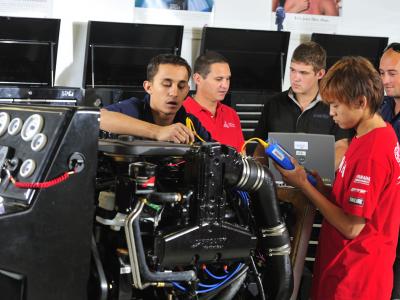What is the difference between a college and a university?
"Colleges" is an umbrella term that we use to encompass a range of different tertiary education providers in Australia and New Zealand. These include Technical and Further Education (TAFE) colleges, Polytechnics, Institutes of Technology, and private training colleges. The key difference between these vocational education providers and universities is that vocational education providers offer primarily vocational courses - these are courses which teach specific skills designed for use in a particular future career.
What qualification/experience will I get?
Australian and New Zealand colleges offer a range of qualifications; certificates, diplomas, advanced diplomas and bachelors degrees. In New Zealand, some colleges also offer postgraduate qualifications. The qualification that you graduate from college with will depend on your chosen course; Study Options can advise you as to which level of qualification might be the most suited to you and your career plans.
The nature of a vocational course means that you will have access to facilities to enable you to practise the skills you are learning. Many colleges also pride themselves on their close links with industry, so there are plenty of opportunities to gain work experience as part of your study.
Why vocational study?
Vocational study provides a very practical, hands-on way of learning the skills you need for work and is designed to get you into your chosen career or profession as directly as possible. For some people, this is naturally a much better option than the more academic options offered at university - reading textbooks and attending lectures - but there are many other draws to studying a college course.
- Many vocational courses are shorter in length and therefore are great for those who want to start working in their new career quickly, or for those who may have already studied one subject at university level and don't want to go through it all again!
- Vocational courses are specialised to a very particular career, they will give you exactly the right experience you will need to go straight into work.
- Practical skills gained through a vocational course are readily transferable; with the right work experience (and in some cases a local, professional certification) you could work anywhere in the world.
Sounds good? Contact us to find out more >
Can I study part time/as an apprentice?
No, it is not possible to study part time in either Australia or New Zealand due to the requirements of the student visa scheme in both countries. However, at some colleges you may be able to undertake regular work experience within your course, check course descriptions carefully to find out.
I’m not sure what – or where – I want to study. Who can I go to for advice?
Study Options. We’re here to help people go and study Down Under – that’s all we do, so we know the countries and their education systems very, very well. If you’d like some advice on what course to study, or what college or location might suit you best, just give us a call or make an appointment to come in for a chat. We can also send out college prospectuses, or lists of all the courses available in a subject area, to help you make an informed decision. We’ve helped hundreds of people go to Australia and New Zealand to study, so get in touch and we can help you too! Explore the What can you study? and Where can you study? sections.
When do courses start?
February, which is the start of the academic year in Australia and New Zealand. Many courses can also be started in July. Some courses do have more regular intakes – please contact Study Options to check what’s available in your subject.
What qualifications will I need to get a place on a course?
Each college sets its own entry requirements so they do vary depending on what course you want to study and which college you want to study it at. But generally, for certificate and diploma courses, you will need to have GCSEs (or the equivalent school-leaving qualification). In some instances, students can qualify for mature age entry on the basis of their work experience.
How long will it take to find out whether I’ve got a place?
The turnaround time on your application will depend on the college and on the time of year that you apply, but in most cases you should allow up to four weeks to find out whether you have been offered a place on the course.
When should I apply?
Although the college will make a decision on your application within a few weeks, we still recommend applying sooner rather than later. First, because places on popular courses fill up quickly, so you need to get your application to us in plenty of time to make sure that you don’t miss out. Second, it’s always better to allow as long as possible – we’d recommend at least a few months – to get everything organised rather than leaving it all to the last minute. If you want to start studying in February, try to get your application to Study Options by the previous September or October. If you want to start in July, aim to get your application to us by February or March. Read more about the application process.

